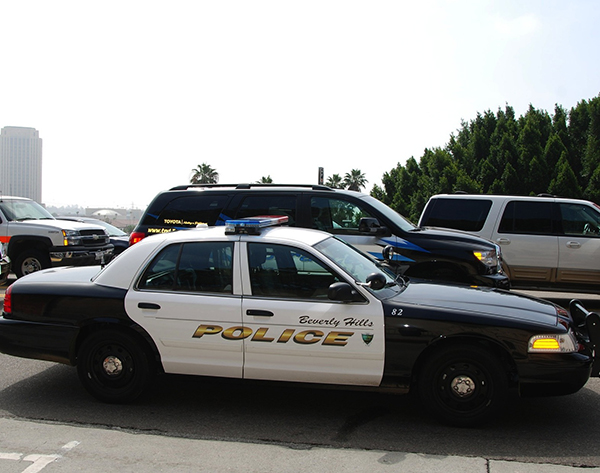THE HUTCHINSON REPORT
By Earl Ofari Hutchinson
Contributing Columnist
Beverly Hills police and city officials predictably circled the wagons when they were plopped again on the legal hot seat recently.
The issue once more was stopping, harassing, targeting, citing and arresting dozens of African Americans in the city for everything from alleged shoplifting to motorized bike or vehicle infractions. The city has been slapped with multiple lawsuits for false arrest and damages.
The real issue is racial profiling. Or more to the point, why do many Blacks call Beverly Hills, Bigotry Hills? That characterization is based on long-standing complaints of harassment of African Americans who drive through, work, shop or even live in the city.
Beverly Hills officials and business leaders protest the charge that they routinely harass Blacks in the city. They simply say they are enforcing ordinances and protecting merchants against theft. However, the arrest and citation numbers tell a far different story.
With almost no exception, the dozens of persons cited or arrested during this latest go-around were Black, with an occasional Hispanic tossed in. If the city was indeed, as it claims, simply enforcing the laws, the numbers would not possibly be so outrageously racially skewed.
You would have to expect someone to believe that there are no young whites riding scooters, skateboards, jaywalking or shoplifting in the city. That claim is laughable, if not pitiable.
It’s even more laughable because of Beverly Hills’ history of racial complaints. In fact, Blacks have long complained that they are stopped, searched, followed and harassed by Beverly Hills police, eyeballed suspiciously by clerks in stores and ignored in restaurants.
A major lawsuit for racial profiling was brought by seven Blacks in 2007. A demonstration and press conference were held at the Beverly Hills school district offices a few years ago complaining of racial discrimination in the schools. Then there was the well-publicized degrading traffic stop and arrest of a prominent Black businessman and the detention of a Black film producer.
Many more such encounters could be cited to make the disturbing case that Beverly Hills simply does not want or welcome African Americans in the city in any numbers.
In response to the loud complaints and the much-deserved bad press the city was getting, city officials agreed to set up a Human Relations Commission to deal with racial discrimination complaints. The question is what is the commission’s purpose and its effectiveness?
This targeting of African Americans in Beverly Hills fit the all-too-familiar pattern of many unwarranted stops of Black and Latino motorists and pedestrians in far too many cities. Predictably, as in most racial profiling allegations, Beverly Hills police and city officials hotly denied the profiling charges.
The stakes in the profiling battle have been dramatically increased with the recent admission by former U.S. Attorney General Eric Holder as a college student and as a federal prosecutor he had been the target of racial profiling.
The point that Holder made is that wealth, status, education and academic, business or artistic credentials can mean absolutely nothing in the eyes of some police whose reflexive equation is Black equals crime.
The refusal by many public officials to admit that racial profiling exists has helped torpedo efforts by local and national civil rights groups to get law enforcement to do something about it.
Many California cities and county police departments, the California Highway Patrol, and University of California police agencies — either voluntarily or through mandatory federal consent decrees — now collect data on unwarranted traffic stops of motorist and civilian contacts to determine if there is a racial bent to the stops. It’s not clear if Beverly Hills is one of those cities.
Nationally, dozens of states do collect data either voluntarily or compelled by state law on unwarranted pedestrian contacts and traffic stops. Still, most police officials, as in Beverly Hills, vigorously contend that good police work is about the business of catching criminals and reducing crime, not about profiling Blacks and Latinos.
If more Black and Latino men are stopped, it’s not because they are Black or Latino, but because they commit more crimes.
The other even more problematic tact used to debunk racial profiling is that there have been few statistics that have been compiled on unwarranted stops.
In two surveys, the federal Bureau of Justice Statistics took a long look at racial profiling using information that it got from citizens. Both times, the agency found that while whites are stopped, searched and arrested less frequently than Blacks or Latinos, but there was no hard proof that the stops had anything to do with race.
This has done even more to dampen the public outcry to get police agencies and legislators to admit that racial profiling is a fact and to take firm action to eliminate it.
The dozens of lawsuits from Blacks alleging racial profiling by Beverly Hills police and business owners and the attempt by Beverly Hills officials to duck, dodge and deny any wrongdoing has deservedly put the city back on the racial profiling hot seat. That’s why many ask is it Beverly Hills or Bigotry Hills?
Earl Ofari Hutchinson is an author and political analyst. His forthcoming book is “Duped: The GOP’s Lock on America’s Underclass” (Middle Passage Press). He also is the host of the weekly Earl Ofari Hutchinson Show on KPFK 90.7 FM Los Angeles and the Pacifica Network.












